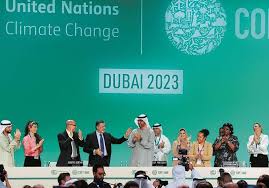NEW DELHI: Financial markets on Tuesday reacted enthusiastically following a decisive victory for former President Donald Trump in the US presidential elections. Environmentalists, however, appeared apprehensive about the future of global climate efforts, including the outcome at the upcoming UN conference COP 29 in Baku, Azerbaijan, where key issues related to finances are on the table.
For them, Trump’s return means a big blow to the US’s actionable action in renewable energy, especially keeping in mind Trump’s past actions and his “key constituency and supporters”.
The fear is that the US may disengage from global efforts to fight climate change, which is a cause for concern given its size and global emission contributions.
Trump is a known climate skeptic and believes that efforts to boost green energy are a “scam”, a reason why those engaged in the sustainability industry are worried that under him the US may disengage with global efforts to fight climate change.
Trump in 2017 had withdrawn the US from the Paris Agreement—a legally binding international treaty with the main goal of limiting temperature increases to 1.5°C above pre-industrial levels.
The US presidential elections come ahead of the Baku climate talks next week when the world leaders will meet to review progress in cutting emissions and raise more money for developing countries.
Environmentalist Soumya Dutta, who will also be there watching the negotiations, says “no one can predict Trump” but the past actions show that “whatever little progress” was made during the Joe Biden administration will “either be reduced or stopped”.
“Trump is unpredictable. In my reading he may not withdraw from the Paris Agreement immediately but he is expected to pull back on the little actionable components undertaken by the Biden administration after the US rejoined the Paris Agreement as coal and oil lobbies are his biggest supporters.
“During the Biden administration there was some support for clean energy and energy efficiency and conservation methods, progressive actions which may reduce if not go completely. His constituency/supporters are of the belief that China and India are not doing enough, businesses in the US are suffering and jobs are going.”
In other words, what environmentalists are foreseeing is a climb down in energy efficiency technologies in the name of US business advantage.
There may also be lesser funds for development of carbon markets and incentives to fund the transition to clean energy.
It can be a major concern given the size and global emission contributions of the US.
It is also a setback for global climate movement and meeting internationally agreed targets.
Trump’s electoral promises include drilling more oil, which means going slow on renewables.
The US rejoined the Paris Agreement in 2021 under Biden.
At COP 28 climate talks in Dubai, countries had agreed on “transition” away from fossil fuels and triple renewable energy.
According to an MoEF official, a large number of Americans also support expansion of strategies to protect and restore forests, grasslands and wetlands to store more carbon and efforts on green energy and renewables, however, Trump’s last term in office can be an indication to his response and contributions to the global climate efforts.
However, one can draw some comfort from the fact that renewable energy is also driven by market forces and private sector demand. In other words, despite Trump’s active pro-fossil fuel stance, renewable energy efforts can never stop entirely.
The Baku conference is also being called “climate finance COP” keeping in mind its ultimate goal, generating money to help developing nations deal with climate change-related costs. There will be an evaluation of Loss and Damage fund and also setting a new quantified real assessment amount of $100 billion fixed way back.
The current $100 billion pledge expires at the end of this year.
Rich nations have only sometimes met that annual goal.
The upcoming COP 29 is aiming for a higher target for the years ahead though wealthy nations say climate money cannot come entirely from them.


